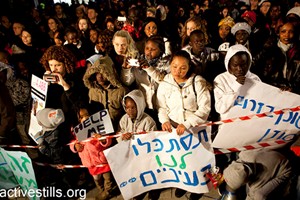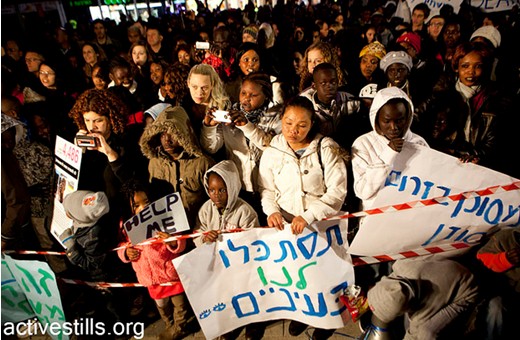
Only a few days before South Sudanese in Israel were to face potential deportations, the Jerusalem District Court issued an injunction Thursday delaying any deportations until April 15. The decision was in response to a petition issued earlier in the day by a series of NGOs including the Association for Civil Rights in Israel, the Hotline for Migrant Workers, the African Refugee Development Center, the ASSAF Aid Organization for Refugees and Asylum Seekers in Israel and Physicians for Human Rights.
The petitioners argued that returning South Sudanese to their home country at this point in time would gravely endanger their lives, considering the dire living conditions and sporadic fighting plaguing the country. Also Thursday, the Foreign Ministry sent a letter to the Population, Immigration and Borders Authority (PIBA), asking for them to consider delaying the deportations, so that the ministry can have more time to examine the situation on the ground in South Sudan.

South Sudanese refugees and Israeli protesting in Tel-Aviv against the government decision to deport all South Sudanese refugees back to their country, on Saturday, March 17, 2012 (Photo: Activestills)
Speaking of the Jerusalem District Court’s decision and the MFA’s recommendation, Orit Marom, Advocacy Coordinator at ASSAF, remarked: “We are pleased with the court’s decision and welcome the Ministry of Foreign Affairs’ recognition of the hard realities in South Sudan – that deportation at such time would be tantamount to a terrible sentence for the families and children. The South Sudanese refugees in Israel are taking a brief sigh of relief and hoping that in the coming days the Prime Minister will decide to continue granting them protection and thus spare their lives from war, violence and hunger.”
As of Sunday, April 1, the community of around 1,000 South Sudanese in Israel was to face deportations in keeping with a government decision announced by PIBA on January 31. PIBA stated that following the establishment of South Sudan as an independent country last July, they will no longer be considered refugees come April 1 and should prepare their departure.
South Sudanese also fear that fighting with Sudan could break out again. Although a peace treaty was signed in 2005, Sudan has bombed the pro-south stronghold of South Kordofan in recent months. And tensions with Sudan over South Sudan’s oil reserves remain high. South Sudan faces additional problems: one in three children suffer from malnutrition; almost 50 percent of South Sudanese lack access to clean water.
After visiting the country in February, UN Emergency Relief Coordinator Valerie Amos remarked, “The situation in the country is extremely precarious, and the risk of a dangerous decline is very real. Food insecurity has already increased, and 2012 will witness an earlier, and a longer, season of hunger.”
Israel is home to approximately 35,000 African asylum seekers, many of whom are Eritrean and Sudanese. Israel does not grant them refugee status, nor will the state process their claims. The state, however, does not deport most asylum seekers, thus giving them a sort of de facto recognition.


